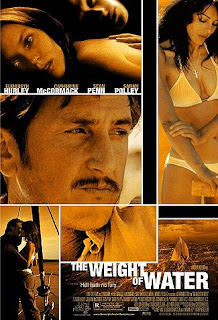The Weight of Water
 As a woman director, Kathryn Bigelow is held to certain standards that are totally unfair. When she became the first woman to win the Oscar for Best Director, she seemed to want no part of being a trailblazer, and wanted to be considered a director, and not a symbol. As such, a lot of people have mentioned that her films don't seem like the kind of fare that a woman would direct--high-octane action films, mostly, as if a woman were incapable of finding that type of film interesting.
As a woman director, Kathryn Bigelow is held to certain standards that are totally unfair. When she became the first woman to win the Oscar for Best Director, she seemed to want no part of being a trailblazer, and wanted to be considered a director, and not a symbol. As such, a lot of people have mentioned that her films don't seem like the kind of fare that a woman would direct--high-octane action films, mostly, as if a woman were incapable of finding that type of film interesting.Therefore I found it interesting to view The Weight of Water, which was released in 2002 (but sat on the shelf for a long time). It is, in the limited way of looking at things, the film most fitting the stereotype of female directors. There is some action--notably multiple views of two women being murdered, one with an ax, and a ship in a middle of a squall--but mostly it's a meditative look at two sets of characters, united in location but separated by time. At the risk of sounding like a pig, it's the only Bigelow film that could be considered a "woman's" picture.
Perhaps this is why it's a total dud. Tortuously slow, and ultimately pointless, the film never really connects the parallel stories, though it tries mightily. And though the cast is eclectic (Sean Penn and Elizabeth Hurley!?) nothing they do seems to be motivated by anything.
The film is set off the coast of New Hampshire. One story is set in 1873, when two Norwegian immigrant women are brutally murdered. A third (Sarah Polley), escapes, and identifies a fisherman (Ciaran Hinds) as the killer. He is put on trial, and we flash back to when Polley and her husband arrived from Norway. All along we sense there's something not quite right with Polley, especially her relationship with her brother. When he arrives a few years later, with a bride (Vinessa Shaw) things start to become more apparent.
In the present day, Penn and his photojournalist wife (Catherine McCormack) visit Penn's brother (Josh Lucas) on his boat. He has agreed to take McCormack to the island of the murders so she can take pictures. Also along on the trip is Lucas' girlfriend, Hurley, who flirts shamelessly with Penn (in a significant departure with reality, Penn is a poet who is so famous that strangers recognize him. I don't think any poet today has that kind of fame). There's a lot of tension as Hurley throws herself at Penn, while McCormack becomes convinced that Hinds was innocent, and that Polley committed the crimes.
The action cuts back and forth between the two stories. The murder story is more convincing, as the period seems right and Polley is pretty good as the icy fisherman's wife. The modern scenes never mesh with the older story. Hurley seems to do nothing but lounge around in a bikini (sometimes without the top), which was welcome but totally gratuitous. Things pick up during the storm scene which ends the film, but it was too late.
The film was based on a novel (though the murders are factual), and it shows, as the film has a novelistic approach, with clearly delineated chapter breaks. There's nothing inherently wrong with that, but the meat of the story just isn't enough to sustain it.


Comments
Post a Comment